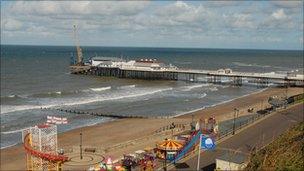Blue Flag beaches 'should lose top award'
- Published

The campaigners' research came from the Freedom of Information Act
More than a quarter of Britain's beaches awarded a Blue Flag for water quality should lose the status, campaigners have said.
Research from Surfers Against Sewage found 34 beaches were unable to warn the public about raw sewage in the sea.
Providing warnings are a requirement imposed by the Blue Flag programme.
There are 131 beaches in Britain which have passed strict tests to fly the flag marking excellence in water quality and beach cleanliness.
Using the Freedom of Information Act, SAS found local authorities responsible for 34 beaches in Britain, external did not request real-time information on combined sewage overflow discharge.
Of these, 20 are in England, two in Scotland, nine in Wales and three in Northern Ireland.
SAS campaign director Andy Cummins said the "disturbing revelation" questioned the integrity of the programme.
"At 34 beaches around the UK, the Blue Flag can be flying and people could be in the sea bathing in sewage-polluted waters without warning," he said.
"To ensure the Blue Flag isn't devalued SAS are urging Blue Flag's governing body to lower these 34 Blue Flags until they meet all the imperative criteria."
'Withdraw flags'
Keep Britain Tidy runs the scheme in England, where beaches in Cornwall, Kent, the Isle of Wight, Devon, Suffolk, Norfolk, Lincolnshire, Yorkshire and Northumbria were highlighted.
A spokeswoman said water quality at Blue Flag beaches was monitored by the Environment Agency during the bathing season and beach managers were required to display the results so bathers could decide whether to enter the water.
"We cannot be present on every award-holding beach every day, and therefore if evidence is presented to us that calls into question that the high standards required are not being met, then we will investigate and take the appropriate action - even if that means withdrawing Blue Flag," she said.
"Since the awards for 2010 were announced in May we have reminded the beach managers of the Blue Flag criteria and their obligations to take the Blue Flag down when their beach is not meeting all the criteria."
John Summers, chief executive of Keep Scotland Beautiful, which administers the scheme in Scotland where two beaches in Fife were highlighted, said it was investigating the claims.
"Scottish Water, the Scottish Environment Protection Agency (SEPA) and the local authorities already work closely with Keep Scotland Beautiful to ensure that the information provided to the public about water quality and short-term pollution incidents is accurate and up-to-date at the beaches," he said.
A spokesman for Welsh Blue Flag co-ordinator, Keep Wales Tidy, where beaches in Denbighshire, Ynys mon, Gwynedd, Ceredigion, Pembrokeshire and Glamorgan were highlighted, said: "When there is a pollution incident local authorities take immediate action to let us and the public know.
"We insist that water quality is posted on the beaches and Blue Flag beaches have a beach warden."
No-one from Tidy Northern Ireland, where beaches in County Londonderry and Antrim were highlighted, was available to comment.
The Blue Flag programme is a worldwide initiative run by independent non-profit group the Foundation for Environmental Education.